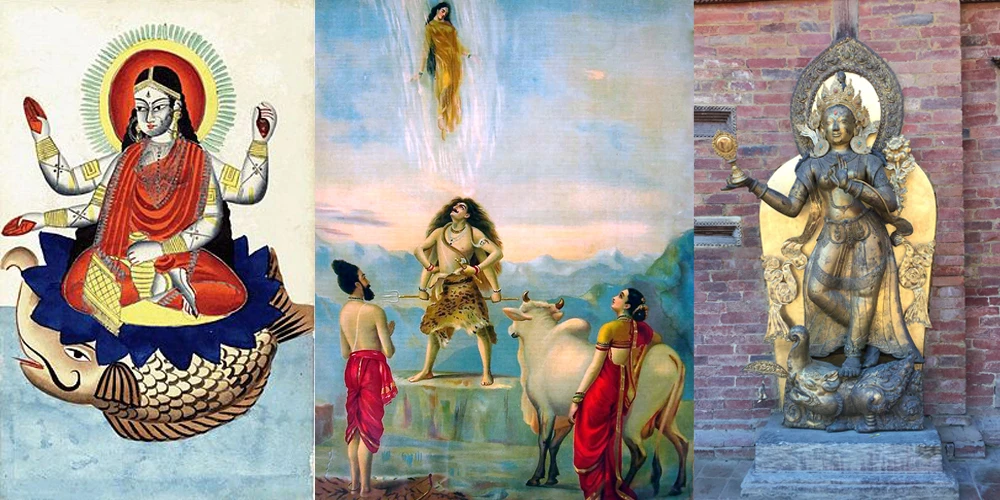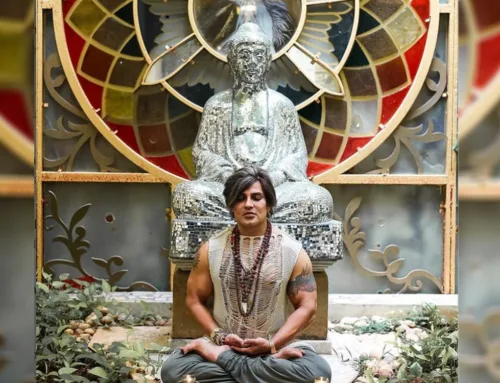देवि सुरेश्वरि भगवति गङ्गे त्रिभुवनतारिणि तरलतरङ्गे ।
शङ्करमौलिविहारिणि विमले मम मतिरास्तां तव पदकमले॥
“O Devi Bhagavati Ganga, the Goddess of the Devas, you liberate the Three Worlds with the merciful water form of yours |
O the Stainless pure one who resides in the Head of Shankara, May my devotion remain firmly established on you Lotus Feet.”
The Ganga, a sacred river that flows across the northern region of Bharat and is known to Europeans as the Ganges, rises in the powerful Himalayan mountains. Ganga reaches Central India and flows serenely after slicing through the vast, snowy mountains with great energy. She is the largest river running through India and provides water to millions of Indians as well as Bangladeshis. Hindus have long honoured her as the Goddess Ganga. Mr Yash Birla, who is known as ‘The Spiritual Captialist’ of India, worships Maa Ganga with all his heart. Every year, at least 3-4 times, Yash Birla visits his humble adobe in Rishikesh to spend some time near the serene river. In this blog, we are going to look at the story and significance of river Ganga.
One is said to be able to atone for their sins and move closer to Moksha by taking a bath in the Holy Ganga. In order to achieve Moksha, the spirits, one can also pour their beloved’s ashes in the Ganga. Although the majority of Indians revere Ganga as a goddess, few are aware of her origins. In the texts of Hindu mythology, the intriguing tale of Ganga’s birth is mentioned.
In Hindu mythology, Lord Vishnu has ten incarnations known as “Dashavathara.” A dwarf named Vamana is one of Vishnu’s incarnations, which he adopted to put an end to the horrors committed by the demon Bali, who attained sufficient strength to overthrow the gods and cast them out of heaven. When the demon Bali saw Lord Vishnu in the form of Vamana, he was duped into making a pact. The demon consented when he was told to give him the territory he controls in three phases. He crossed the entire Earth in his first step and the sky in his second when Brahma bathed his feet with his water jug and gave birth to Ganga. Vamana pushed the Demon Bali back into the underworld at the third step. Ganga was born from the water in Brahma’s pot.
Later, Ganga encountered Durvasa rishi. Being a Shiva incarnation, Durvasa rishi was well known for having a temper. Ganga encountered Durvasa, whose clothing had been blown away by the wind. When Ganga saw this, he burst out laughing at him, which greatly incensed him. Durvasa immediately cursed Ganga in his rage. He cursed Ganga, causing her to reincarnate as a river for people, aiding in their physical and spiritual purification.

Ganga’s Incarnation as a River
Rama’s ancestor, Sagara, was a king who reigned in the distant past. King Sagara was a powerful ruler with great strength. Keshini and Sumati were his spouses. The King had a son from his second wife Keshini and 60,000 sons from his first wife Sumati. King Sagara once made the decision to undertake Ashwamedha Yaga (the sacrifice of a horse), believing that it would grant him unrestricted power and dominance. Indra, God of Gods, was frightened by this.
The horse that King Sagara planned to sacrifice was taken by Lord Indra, who then disguised it by tying it to a tree beneath which the philosopher Kapila was meditating. Manu, the great-grandson of Brahma, was the ancestor of Kapila. After investigating the entire planet, King Sagara dispatched his sixty thousand sons to find the missing horse, which they eventually located in Sage Kapila’s Hermitage. The sons of Sagara accused Sage Kapila of stealing the horse because they believed he had done so. Sagara’s sons had insulted him, and Sage Kapila became furious. He used the fire from his third eye to burn them into ashes.
Ansuman, the last son of King Sagara and Queen Keshini, went to Sage Kapila and requested him to show him how to free his siblings’ souls after learning about their fate. The great sage gave him the advice to meditate in Brahma’s name and appease him in order to get him to release Ganga from his water jug. He claimed that Ganga’s holy water would cleanse their souls. Ansuman began his meditation in an effort to win the favour of Lord Brahma, but he was unsuccessful. Many generations after that made repeated attempts to win over Brahma but all went in vain. Bhagiratha was born in the seventh generation of King Sagara. He was incredibly focused and determined. He spent a long time devotedly worshipping Lord Brahma. The adoration of Bhagiratha pleased Lord Brahma, and he consented to assist him. To keep the power of Ganga in his hair, however, Bhagiratha had to serve Lord Shiva; else, she would fill the entire Earth.
Years later, Bhagiratha continued to worship, but this time he was worshipping Lord Shiva. After a few more years, Lord Shiva decided to hold Ganga in his hair since he was happy. Ganga descended from the skies with great force when Brahma freed her. Lord Shiva stopped her with his hair, preventing even a drop of rain from falling on Earth. In the end, Lord Shiva entirely ensnared Ganga in his hair till her strength subsided. Ganga was partially released by Lord Shiva when she had calmed down, and he gave her the order to follow Bhagiratha.
When Ganga followed Bhagiratha, she did so with great speed, causing great turbulence that caused a flood that wiped out Sage Jahnu’s cottage and his fields. This action by Ganga severely incensed Sage Jahnu, who as a form of retaliation sucked up and devoured Ganga whole. Along with Bhagiratha, the gods prayed to the Sage Jahnu. After some time, the Sage became more composed and released Ganga, who then carried on following Bhagiratha. As a result, Ganga is sometimes referred to as Jahnavi.
Millions of people took cleansing baths in the Holy River as Ganga followed Bhagiratha. Ganga eventually arrived at Sage Kapila’s tree. Thus, Ganga became known as the Holy River of Bharat after liberating the sixty thousand souls of King Sagara’s sons.
The story and significance of river Ganga play a vital role in the belief of the Hindus as well as the life of Yash Birla. Hindus in India still worship the Ganga and partake in holy baths to cleanse themselves of their sins today, says Yash Birla. At the conclusion of the Kali Yuga, it is predicted that the Holy River would run empty (era).






Leave A Comment